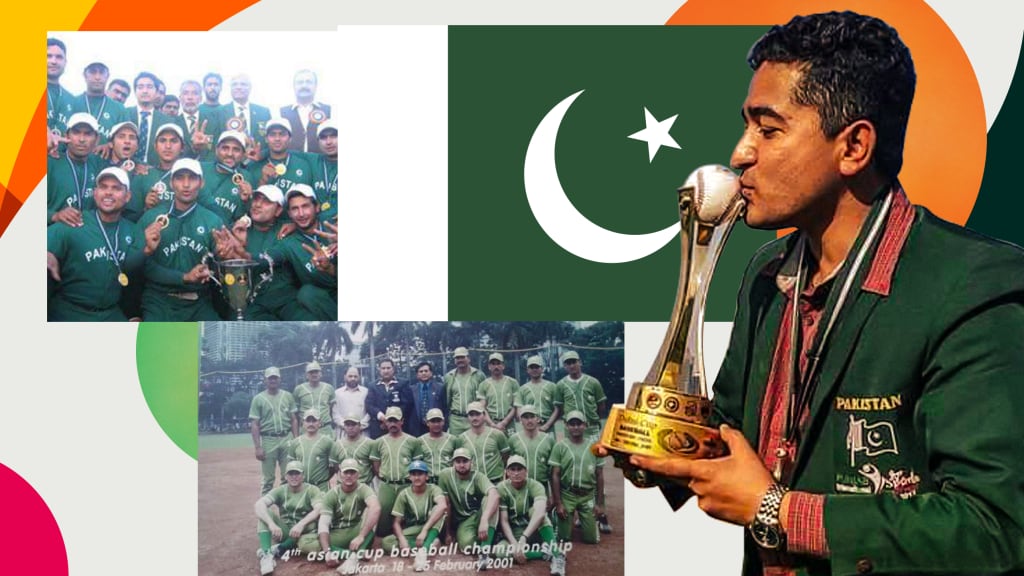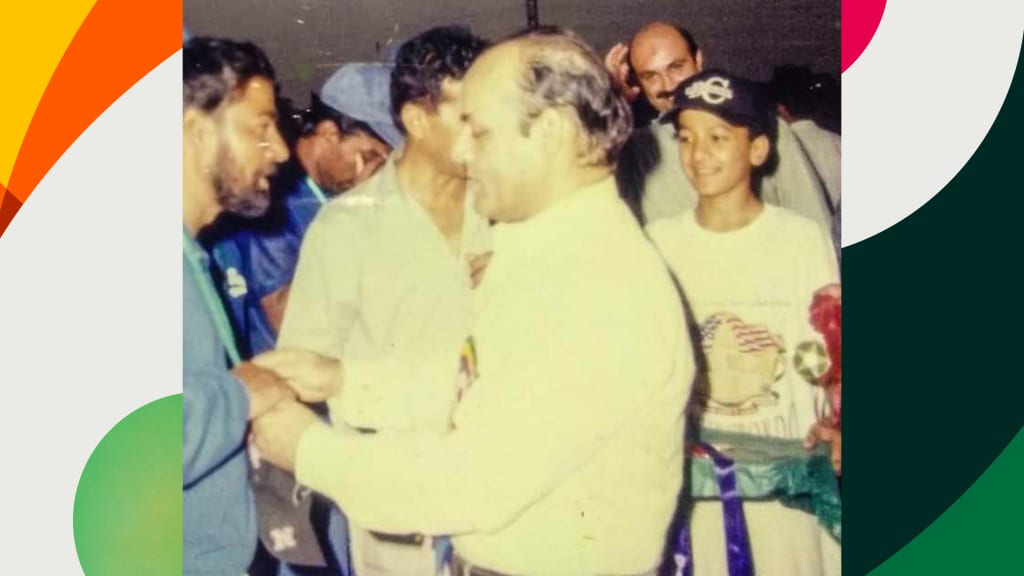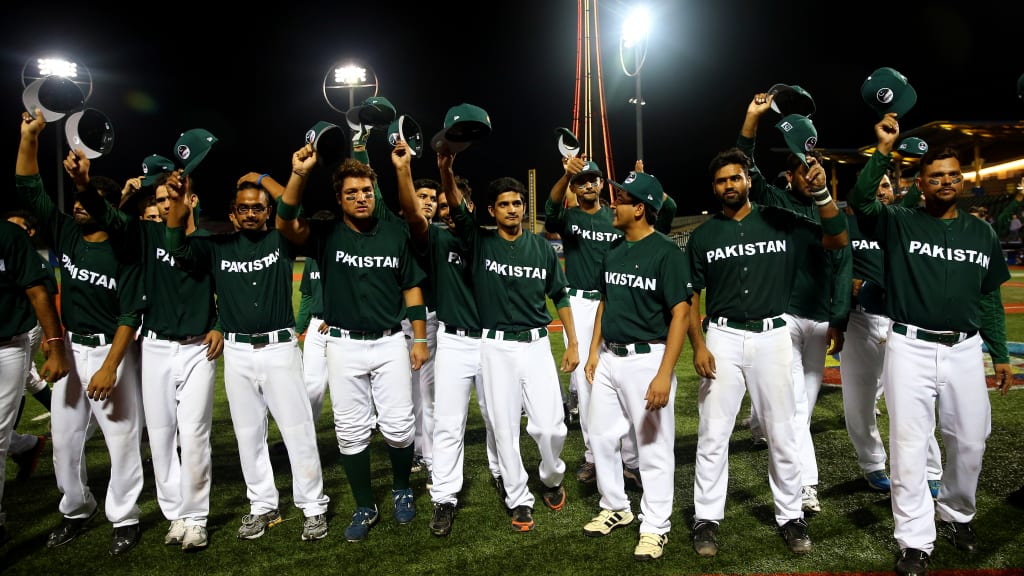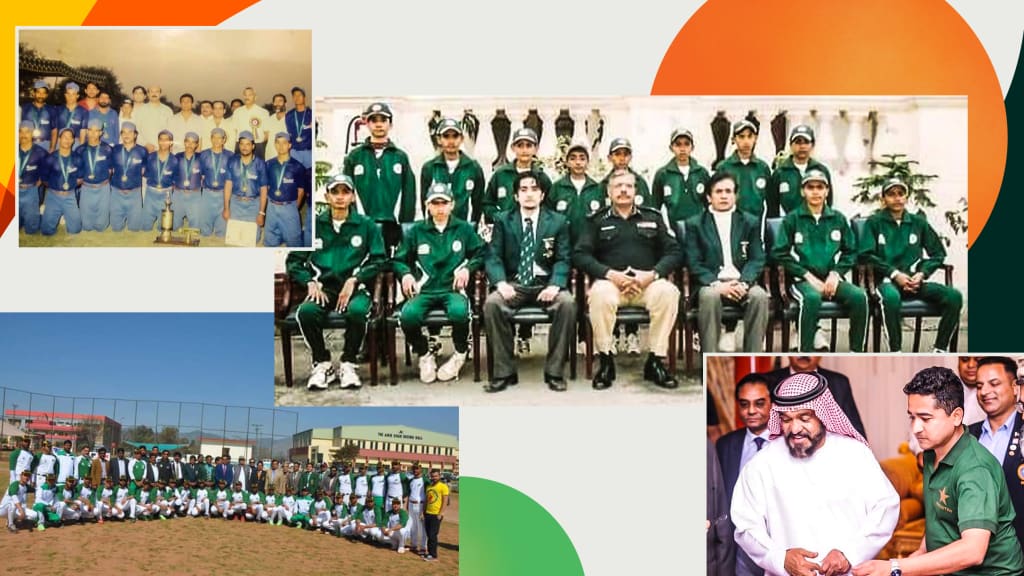
In a way, Syed Fakhar Ali Shah has been preparing for this his entire life. The current manager of Team Pakistan's Baseball Team and the head of its baseball federation, Shah was there as a young child at the first ever Pakistan Baseball Federation event in 1992.
"I'm 7 years old and I am sitting in the Federation's official meeting. I'm [there], attending as a founding member in 1993," Shah said. "Nobody in the world is going to believe that a person who is around seven-and-a-half was officially taking care of the meeting while baseball was being introduced!"
Shah's father, Syed Khawar Shah -- who passed away in 2018 -- assembled the group and gifted his son the baseball dream when Pakistan first fielded a team before the 1992 Olympics.
"Everyone who worked in sports was invited," Shah said. "There were 50 people -- educated, sports-related, people with a master's degree, who ever played for Pakistan in other sports was there. My father said, 'We're going to have baseball in Pakistan and you'll have a national championship in two months.' They were like, 'What's baseball?'"

Since then, Shah has devoted his life to baseball, helping get the program ranked as high as 23rd in the world despite lacking a single baseball-dedicated field in the country. Shah played catcher for Pakistan's National Team in 2003 -- taking the position no one else wanted and making sure that he was skilled enough that no one could accuse the team of nepotism.
"The first time I played, I was like, 'I have to be number one.' Because it's my father's dream," Shah said. "And if I play well, I help the team win. I don't want people to feel that it's because of his father that he's playing."
He even oversaw youth teams when he was just 16 years old. When it came time for them to travel to tournaments in Asia, another manager who was an actual adult had to step in. After all, how can you be taken seriously on the international circuit when you have a teenager at the helm?

Those decades of work have now led to this weekend, when Pakistan plays at the Panama City World Baseball Classic Qualifiers. They hope to be one of the two nations who will advance to the main tournament in March. It's a big stage to play on, as Pakistan's competition includes established baseball nations like Panama and Nicaragua and emerging programs like Argentina and Brazil.
Pakistan became beloved underdogs at the Brooklyn Qualifier in 2016 -- its first international tournament outside of Asia -- as they were the only team to field a club made up entirely of players who grew up and played baseball in their home country. Many of its best stars, like Zubair Nawaz, were cricket players who had recently converted to baseball for the tournament.
Of course, that came with a downside: Pakistan was defeated by a combined score of 24-0 before being eliminated from the tournament.
(For a sign of how these tournaments can be a springboard for a baseball program: Israel defeated Great Britain in the Brooklyn Qualifier final, en route to becoming the Cinderella story at the 2017 World Baseball Classic. Great Britain just recently won an emotional game at the Regensburg Qualifier to advance to its first-ever World Baseball Classic.)
Since then, Shah has changed his focus: While he continues to drive young players to play baseball in the country, he expanded his search for the World Baseball Classic. Rather than convert local cricket players into baseball players, he began recruiting athletes with Pakistani heritage who were already playing baseball at a high level in places like America and Canada.
"I see the players who are in MLB, they have a background of 10 years, 15 years, 20 years [of playing baseball], and we just pick a cricket player and say 'OK, you have a good swing, good throw, good, you make the team.'"

He hopes this direction will see the Pakistani team have more on-field success and, eventually, drive more interest in baseball back home.
"Before the World Baseball Classic qualifiers in 2020 [which were canceled due to COVID-19], I started contacting people on social networks. Are there any Pakistani players, whose parents are Pakistani, who were born in Pakistan, that are studying in the USA or studying in Canada and plays baseball?" Shah said.
That approach netted some gems, including Iyad Ansari, one of the team's three catchers, Adam Khan, a 6-foot-4 right-hander attending the University of British Columbia and Amir Asghar, who pitches for Bethune-Cookman University.
"They throw 85 miles per hour. And on my whole team, I have two or three players that maybe throw 85!" Shah exclaimed. "In 2020, I had no player who played college baseball on my team. Now, I have more than 10 players who play in college. That makes a huge difference."
Of course, Shah's search also led him to some intriguing veterans. That included 41-year-old former NFL quarterback Gibran Hamdan, who originally learned to play baseball while growing up in Kuwait. Hamdan, who played in the NFL from 2003-09, also starred as a high-average, solid glove first baseman for Indiana University nearly 20 years ago. So, when Shah reached out to Hamdan to see if he would be interested, the QB teamed up with former NFL quarterback Ryan Fitzpatrick and headed to D-backs legend Luis Gonzalez's backyard facility (how about that for an unexpected dinner party?) to put together a workout video.
"I'm watching a lot of hitting videos on YouTube, I'm spending a lot of time in the swimming pool working on my stance. It's basically like I'm a pro athlete again, and I'm not going to leave any stone unturned," Hamdan said. "I want to do well, I want to play well, I have expectations to be physically prepared, as best as I can be."
Unfortunately, Hamdan won't be traveling to the Panama City Qualifiers as he recently tested positive for Covid-19 and will be recuperating from home. He'll be cheering on his new teammates, though.
"From an expectations of the team standpoint, I think the most important thing is that the young kids that are on the team have a platform to produce, and show what they can do -- especially if they want to further their careers," Hamdan said. "I think that's a really cool aspect for me. I can only imagine back when I was like 18 to 21 getting this opportunity."
Unfortunately, it's not just a matter of interest for baseball to grow in Pakistan. The country has much larger issues than simply playing in a Qualifier. Pakistan recently faced devastating flooding -- its climate minister said it was a disaster of "biblical proportions" -- with millions of people now without shelter or food.
"My players -- some players don't even have a job," Shah said. "How can you fight with 100% with an [empty] stomach? You can't fight. We have nutrition issues. We have physical issues."
For now, the Federation is almost entirely self-funded, with Shah and the organization providing whatever equipment and coaches they can to Pakistan's four states, where local teams play. But still, there is not a single baseball-specific field in the country and the team regularly has to face choices between things like a pitching machine or new team uniforms and the money for meals while playing in Panama City.
"We don't have a pitching machine where my players can face a 100 mph ball. It costs -- shipping and duty -- I need like $30,000 for it," Shah said. "That $30,000 I'm spending on the camp, equipment and the uniforms."
In 2016, Major League Baseball helped supply bats, balls and helmets at the Qualifier, but it wasn't hard for differences between the nations to become apparent. A fan even gifted Pakistan's first baseman with a glove, when he noticed he was playing with the wrong kind of mitt.
"I was in the dugout during the second match and this fan brings his glove. He calls me over and said 'Can you give this glove to your fielder at first base? He's using the wrong glove.' He didn't know that. We can't afford it -- whatever we find, we use it."
For all the challenges, nothing has dimmed Shah's enthusiasm or optimism for the future -- something that is clearly evident in every word he says. At the end of the interview, which lasted nearly 90 minutes, Shah spoke passionately about needing assistance from outside organizations to help his country and sport grow, but his belief has never wavered:
"I'm telling you, you can write openly: 'Mr. Shah said, at the next Qualifier, I bet Pakistan will be top 20,'" he said. "But it's a target I can [only] achieve with the help of my baseball-loving people and stakeholders."
